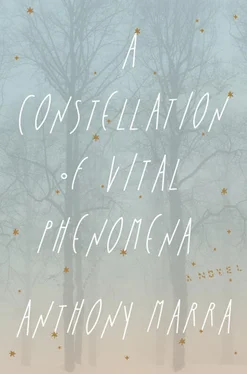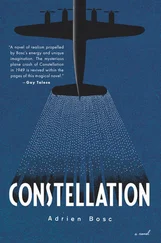The big oaf led her to the office that was her bedroom. He was like a pool of water she’d fallen into; she hit, hit, hit and he was still there, around her. She’d been awake forever. The flap of moths was overwhelming. In the office, he pushed her into the overstuffed executive chair. “You need to rest,” Akhmed said, in a tone of authority obviously an imitation of her own.
“And who do you think you are to order me around?” she asked. Already she missed the corpse. He was a much better conversationalist.
“I think I’m someone who slept last night.” He scanned the bookcase, selected the thickest book from the bottom shelf, and dropped it on the desk. “A medical dictionary. If you won’t read Tolstoy, read this. It will put you to sleep in no time.”
When the door closed behind him, she scrutinized the dictionary, wary of subterfuge. She hadn’t opened the book in years. A surgeon of her skill had no need. Slowly, fearing further hallucinations hid between the covers, she opened the book. It was just as dull as she remembered.
But she was already in, and the crowded little script calmed her. The definitions had the stately reassurance of orthodoxy, reminding her of the prewar years, when she had relied on the reference book to complete her weekly assignments, when she had sat at her desk, her ears plugged with cotton balls, as that awful thudding Natasha called music had pounded from the next room, when she still believed the meaning of a thing was limited to a few tersely worded clauses, but nothing, she now knew, could be defined in exclusion, and every bug, pencil, and grass blade was a dictionary in itself, requiring the definitions of all other things to fulfill its own.
Her fingers shadowed the thin pages and the words appeared written on her skin: the average weight of a hand, interpretations of a knuckle. A shawl of post-high drowsiness wrapped itself around her. She hated to admit it, but Akhmed had been right. Then, halfway through the book, at the bottom of the 1, 322nd page, circled in red ink:
Life: a constellation of vital phenomena — organization, irritability, movement, growth, reproduction, adaptation .
The breaking sky could release no more striking a pronouncement. She repeated it to the unmade bed, to Havaa’s still-packed suitcase, to the desk of the former geriatrics director. Not once had she ever marked a dictionary, but here this was, encircled by the same red pen she’d kept on her nightstand. She stumbled into the corridor, reached out but couldn’t find a wall. Her legs felt as stiff as they had been on the day she had tried to make her own trousers, but when she lost her balance, when she fell forward, Natasha wasn’t there to catch her.
When she woke on the floor, the insides of her cheeks felt like the insides of lemon rinds. She rubbed her temples and checked the unlit overhead lights, but, thankfully, the ceiling was still. In the storage room she pulled a pack of Marlboros from the fresh carton. The crinkle of plastic wrap followed her down the corridor. At the door the one-armed guard declined her offer of a cigarette. Shards gleamed in his ashtray. His name was Mohmad. He didn’t particularly enjoy this job, but he knew enough to know that any man was fortunate to have work these days, particularly amputees. In Ingushetia he had an eleven-year-old daughter he didn’t know about, who was waiting for him to call. In two and a half years he would hear her voice for the first time.
She smoked three cigarettes before Akhmed appeared behind her, warming his hands around a mug of steaming water. “Marlboro?” she offered. He lit the cigarette from her ember.
“You look much better,” he said. The corners of his lips inched toward a grin.
“Shut up.”
“Nothing like a little beauty rest.”
“I’ll light your scrubs on fire if you say another word.”
The incipient smile sagged into an expression of surrender. “They came back for him,” he said. “Whoever dropped him off.”
“Bringing a dead man to a hospital. Do they think we’re magicians?”
“Medical miracles are the only miracles most of us will ever see.”
He had her on that one. “You’re a believer,” she said. That explained his incompetence as well as anything.
“I believe in some things.”
“In God.”
He shook his head.
“But I’ve seen you pray at noon.”
“That’s like asking if I believe in gravity,” he said. “It doesn’t require belief.”
“I’ve always thought Marx’s view on religion was the one thing he got right. Faith is a crutch.”
“If you step on a land mine,” Akhmed said, “the crutch becomes the leg.”
Westminster Abbey was the only steeple she’d ever stood beneath, a tourist guidebook, rather than a prayer book, in hand. God, like everything kind and good, lived in London. She dropped her gaze to her hands and picked at the white calluses that scalloped her palm.
“My goodness. These belong to a lumberjack,” he said, lifting her hands, examining them with a mixture of awe and pity. “Woodsman hands.”
“I hate my hands.” Aloud it sounded as small and petty as it had in her head, but they were horrid things, these hands, a crime for which she felt the immediate relief of confession. “How could such things grow from a woman’s wrist?”
“You’ve chosen the wrong profession. If not a lumberjack, you would have made a marvelous strangler.” With the unexpected sensitivity of a surgeon, his fingers drifted up her forearm.
“I keep thinking in Latin,” she said. He paused on her ulna. “The names of bones.”
“Latin is a problem with which I have no experience.” He squeezed her bicep. “You should think about anatomy like I do. This is your arm. It’s only your arm. This is your shoulder, nothing less than your shoulder. Your neck is only your neck.” His finger rose to a chin that was simply her chin, cheeks that were her cheeks, a nose that belonged to no one else. “And lips,” he said, leaning to her. “Our lips.”
A moment and she pulled away, frowning back at the hospital and smoothing out her scrubs. Of the varying shapes of love, grief, anger, and terror that had inhabited these scrubs, optimistic anticipation was a new one. She looked to his big, stupid face, blushed, and turned away. What would Deshi say if she saw her like this? The shock might very well make her act on her ten-year-long threat to retire.
“I’m going to the fourth floor,” she said, finally. “You could meet me there in a half hour.”
“Even though I’m not a very good doctor.”
“Even though you are criminally incompetent.”
He opened his hands. Not one callus.
“Don’t make fun of my lumberjack hands.”
“I’m not,” he said.
“You are,” she said.
He squinted across the parking lot to the armored truck, thinking of the previous day, perhaps, how she had ambushed him in Grozny, how repellant a woman she was for putting a gun to his head one day and her lips to his the next. When he asked for the keys to the truck, claiming he had forgotten his scarf in the passenger seat, she felt too relieved to dwell on the fact that he hadn’t worn a scarf the day before.
Their footsteps from the previous evening were still evident in the dust of the fourth-floor maternity ward. Natasha’s murals seemed to study her, as if she were their creation. Unsettled at the thought of standing alone among these ghosts, she went to the corridor and opened the storage room door for fresh air. The smashed city stretched to the frozen river. International law prohibited the targeting of medical facilities, which explained why, in a city where eighty percent of freestanding structures had been flattened, the hospital still stood. The shell that had crashed into this very room had been an act of reprisal rather than war. Natasha had collapsed with the walls, fallen with Maali, kept aloft by momentary updrafts, then plunged ever downward, until the earth had yawned open and she had entered it. Sonja knew the two had been coconspirators and confederates, sisters to ambitious, demanding women. She knew Natasha hadn’t been right after Maali’s tumble. She didn’t know that Maali, eighteen minutes Deshi’s junior, had lived her sixty-seven years in those eighteen minutes, finding room there for every dream, fear, and exasperation, setting her watch eighteen minutes ahead so she could pretend she had Deshi’s experience, always wondering what her life would have been like if she were just eighteen minutes older. Natasha had loved Maali for this as much as for her demented enthusiasm for amputation, but Sonja didn’t know it. In four months, when cleaning out a file cabinet, she would find municipal buildings drawn on the back of payroll forms. Long, uneven lines of Maali’s penmanship disfigured Natasha’s sketches, her critiques sometimes playful, sometimes damning, but always invested, and in those sketches, framed and hanging in the waiting room, as they would be within an afternoon, Sonja would see what the two younger sisters meant to each other.
Читать дальше











